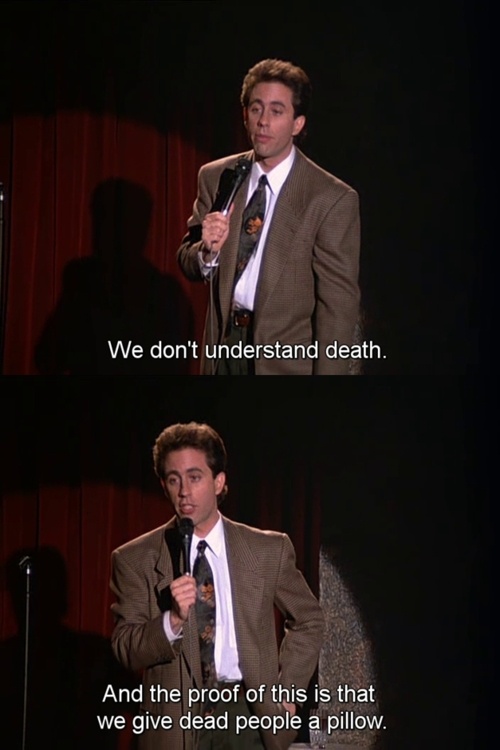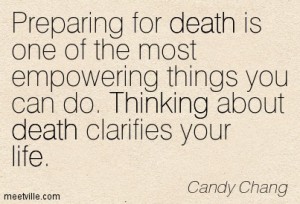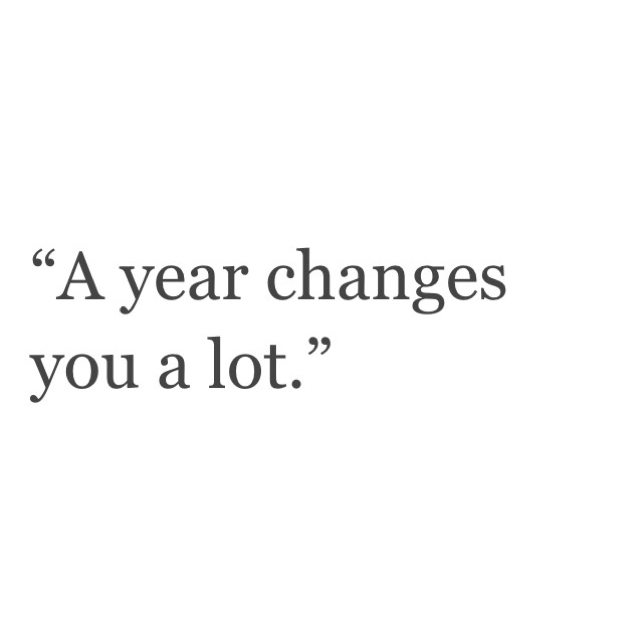Why Thinking About Death is Actually Good for You
It seems that most people generally fall into one of these two categories when it comes to thinking about death;
1. Total Avoidance: Death freaks you out, you don’t like how it makes you feel so you choose not to think about it (because that’s going to help). Some people cope with their fear of death by dieting, working out, and worrying about their body. Others are fearful of taking risks or doing potentially dangerous things, even basic sports. People can live their lives in bubbles from a fear of dying when they are arguably, in far more danger of never living.
2. Comfortable & Curious: As much as is possible, you’ve come to terms with the fact that you’ll die. Perhaps you’ve seen a parent die and instead of fear there is a certain sense of peace and acceptance you feel when death comes up and you aren’t afraid to talk to others about it or ask about their stories.
I’ve seen both people, they’re very easy to tell apart. When someone asks me where I work they tend to either respond with silence (afraid of death) or they share with me a story of someone close to them who isn’t doing well or who has died (facing a need to accept or already have accepted death).
There is something about seeing death in the day-to-day that I’ve been told puts you in danger of being jaded or insensitive but it hasn’t had that effect as of yet. I’ve found that it has helped me accept the frequency, and understand some level of the magnitude on which death occurs. It has also made me see with so much clarity the freedom of living in the light of knowing you will die vs. the paralysis that can come with living in constant fear of death.
Here are a few death-related things that might surprise you:
– Thinking about death promotes healthy and pro-social behaviors at least according to this article. Just walking by a cemetery can cause you to think and create positive changes in your life – pretty cool right?
– There is an app for EVERYTHING and there is one that will tell you how much time you have left on this earth. iDie calculates your life expectancy from your birthdate and shows you how much time you’ve probably got left. In other words, it doesn’t allow you to forget that you’re dying and what’s the point in forgetting?
 – Thinking about death could make you funnier – this may sound crass but I’ve noticed that the deeper the pain the easier the laugh. Our mortuary is filled with some of the funniest people I know, these same people are also some of the most dedicated, compassionate and deeply sensitive people you could ever meet. It’s a matter of balance like all things, but when you work at a mortuary you are entitled to have a few laughs (in my opinion).
– Thinking about death could make you funnier – this may sound crass but I’ve noticed that the deeper the pain the easier the laugh. Our mortuary is filled with some of the funniest people I know, these same people are also some of the most dedicated, compassionate and deeply sensitive people you could ever meet. It’s a matter of balance like all things, but when you work at a mortuary you are entitled to have a few laughs (in my opinion).
– Thinking about death can make you value life more – this article talks about a study that found people who wrote about their own mortality or other death related topics reported lower levels of depression, increased self-esteem and higher motivation.
– Way more people talk about death than you think – this is my own conjecture but I’m fairly certain it’s true. In our love of people, of life, of moments we realize they don’t last forever and as we think about endings we think about death. People think it sounds macabre to say but if we were all just honest, we’d find we weren’t as alone in our thoughts and I think the world, would honestly, be a better place.
So that ought to sum it up; you should think about death more. Not much more perhaps, but give it your attention when you’ve got the time and energy to do so. Maybe even walk by that cemetery for some value-adding, life-changing vibes.
If you’re intrigued by this idea, I’ve got an interesting challenge for you. Have a go at writing your own obituary, see what you say about yourself, your life, your family – I think it will be a more positive experience then you think (at least I hope so).
 Death is a profound and thought-provoking subject that can, if given enough thought, change your life.
Death is a profound and thought-provoking subject that can, if given enough thought, change your life.
|| what do you think?
– Do you think about death?
– Is it uncomfortable or a welcome topic?
– Have you noticed any positive changes from thinking about it?





45 Comments
Molly,
Working here, I think about death every day. Much more than I did before I worked here, even in mortuary school. I think that seeing it every day and dealing with so many people experiencing it definitely helps me and my acceptance of death. When I was younger death always seemed to happen to only a few people, usually people I didn’t know well, so it seemed like it didn’t touch everyone. Working here makes it really obvious that everyone goes through these things, it’s a part of life, and it makes living so much more of a gift. It is definitely a welcome topic to me because it is a reminder to respect all people and not to take anything for granted.
Shasta,
You are so young for so much wisdom! It does seem, in our youth (if we are lucky I suppose) that dying only happens in other people’s families. At whatever age when that belief becomes the myth that it really is, we are awakened to a painful reality. There are few things that unite ALL people but death is something we can all look to as a shared experience. How incredible? And yes, how worthy then are all people of our respect?
Love your perspective, thank you for sharing it!
Molly
Molly,
For us, thinking about death is occupationally unavoidable. I believe that fact helped me when I was diagnosed with cancer in 1988. I recall my first week long chemotherapy session in the hospital and as I was staring at the ceiling I wondered how many people that I had cared for and prepared for their funeral might have stared at the very same ceiling I was now mindlessly gazing at, it brought an unexpected smile to my face. I know that others had been here before me and that some went home and some came into my care. It seemed ironically funny at the time and was a teaching moment for me. I was 29 and hadn’t really planned on dying that young but I learned that I was not immune like I was kind of hoping to be.
Ecclesiastes 7, verses 2 through 4 says:
2 Better to spend your time at funerals than at parties.
After all, everyone dies—
so the living should take this to heart.
3 Sorrow is better than laughter,
for sadness has a refining influence on us.
4 A wise person thinks a lot about death,
while a fool thinks only about having a good time.
Contemplating our mortality in a balanced way can lend a greater understanding and appreciation of the significant moments life holds even in our daily routines. Just as sickness makes us long for health, the reality of death can increase our thirst for life and therefore lead to a more satisfying drink of it everyday.
Jeff
Pops,
When are you going to write a blog for me?! Oh my gosh … that moment is incredible. I can’t get over the perspective and epiphany of that moment, lying there on you back, realizing you’re as helpless as they were and what a fleeting thing life can be.
I was just sharing with a friend about working here and I found myself saying, “feeling pain like this is a privilege.” I truly believe it is. I love the perspective that the Bible shares in support of this way of thinking.
Thank you SO much for sharing this!
Molly
Molly,
For us, thinking about death is occupationally unavoidable. I believe that fact helped me when I was diagnosed with cancer in 1988. I recall my first week long chemotherapy session in the hospital and as I was staring at the ceiling I wondered how many people that I had cared for and prepared for their funeral might have stared at the very same ceiling I was now mindlessly gazing at. It seemed ironically funny at the time. I was 29 and hadn’t really planned on dying that young but I learned that I was not immune like I was kind of hoping to be.
Ecclesiastes 7, verses 2 through 4 says:
2 Better to spend your time at funerals than at parties.
After all, everyone dies—
so the living should take this to heart.
3 Sorrow is better than laughter,
for sadness has a refining influence on us.
4 A wise person thinks a lot about death,
while a fool thinks only about having a good time.
Contemplating our mortality in a balanced way can lend a greater understanding and appreciation of the significant moments life holds even in our daily routines. Just as sickness makes us long for health, the reality of death can increase our thirst for life and therefore lead to a more satisfying drink of it everyday.
Jeff
Hi Molly,
Maybe it’s because of my mid-western upbringing, but I think I have always leaned toward the “comfortable and curious” side. I love your quote that says, “Thinking about death clarifies your life.” That one sentence is so thought-provoking it could be a Death Cafe session all to itself.
It is so interesting to me, since I have worked at O’Connor Mortuary, to see how casual conversations and dinner topics with friends and family have shifted to often include talk about death. I think people close to me feel safe talking about death because of my job here.
Thank you for the very interesting blog – I think I will bring it up in conversation at my next dinner party!
Becky
Becky,
Thank you so much! I’m so glad you found this interesting and thought-provoking. It’s fascinating that you’ve noticed a change in conversation around you because of your job-switch – what a testimony to the power of people wanting someone safe and trustworthy to talk about death with. You are a gift to them and I hope you always feel that way.
Thank you so much for sharing how your life and interactions with others have changed and all because of a mortuary : )
Molly
Molly,
Great, thought provoking blog and I believe right on the money. Let’s face it, it is the greatest mystery of all, for all mankind, death. The mighty fear of the unknown for so many, even people of faith.When we confront our fears, it is then, that our strength comes forward. As funeral directors we do get one of two reactions when we communicate what we do. People either turn and run, or gravitate to you and never leave your side.
The most compassionate and caring people I know, also have the best sense of humor. When you can laugh at yourself and not take this life to seriously it allows you to be there for others and to give of yourself. Death should not be feared, everything alive in this world dies, but that does not mean that we do not grieve when someone close to us dies. The price of love is grief and in grief is pain and anguish. But, would we have rather never loved? Thanks for enlightening us, now it’s time to take that walk past the cemetery.
Oh Chuck, that’s so well put. I recently saw a quote that said, “Don’t take life too seriously, you won’t get out of it alive” – isn’t that great? I know I grew up with the perspective that the mortuary was a place full of funny people who had to do sad/difficult things but who also knew how to really, truly enjoy life. I think that is an incredible testimony to the true heart-healthiness of our team. There is always an appropriate place and time but when we CAN laugh, we should always try to.
Thanks so much for sharing!